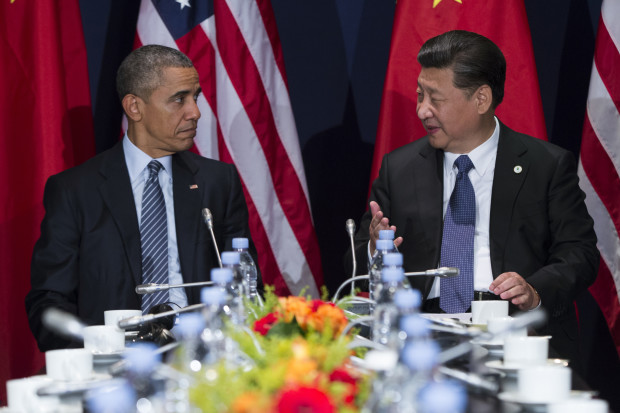A look at China’s foreign policy challenges

FILE – In this Nov. 30, 2015, file photo, U.S. President Barack Obama, left, meets with Chinese President Xi Jinping on the sidelines of the COP21 United Nations Climate Change Conference in Le Bourget, outside Paris, Monday, Nov. 30, 2015. AP FILE PHOTO
BEIJING — China’s simmering feud with South Korea over the deployment of an American missile defense system is the latest in a string of foreign policy challenges piling up on President Xi Jinping’s desk as he prepares to host the annual summit of the G20 nations next month. Below is a look at some of the more significant issues, most of them related in one way or another to China’s rivalry with the United States.
South Korea
Chinese anger at South Korea over its decision to deploy and US anti-missile defense system appears to be threatening everything from appearances by the stars of K-Pop to future cooperation on North Korea at the United Nations. South Korea’s entertainment sector has been on edge since Seoul’s decision last month to proceed with the Terminal High Altitude Area Defense, or THAAD, system, and reports are trickling in of event cancellations and possible bans on the showing of South Korean TV series. A chill has already descended over the political relationship, with daily attacks in Chinese state media on South Korea and the US over THAAD, even hinting that Beijing might withhold future cooperation with the US against North Korea at the United Nations Security Council.
READ: Pop stars, diplomacy victims of cooling China-Korea ties
North Korea
China’s efforts to moderate the behavior of the regime of North Korean leader Kim Jong Un have produced few results. North Korea’s secretive ruler appears not to have been swayed in the slightest by China-backed United Nations sanctions seeking to deter him from his drive for nuclear weapons and the missiles to launch them on. Beijing has also failed to convince him to reform his economy while retaining authoritarian rule along lines pursued by China in recent decades. While China is not actively defending its communist neighbor and once-close ally, it is equally determined to prevent its collapse, an event that could see a massive flow of refugees and even U.S. troops taking up positions along the border with China.
READ: China thwarts UN condemnation of North Korea missile launch
South China Sea
An international arbitration panel’s ruling last month that invalidated China’s expansive maritime claims in the South China Sea prompted a furious response from Beijing, which had vowed not to participate in it or accept the ruling. Although unenforceable, the ruling seriously questions the legitimacy of China’s nine-dash line maritime border enclosing almost the entire sea and its islands and reefs, and puts Beijing on the defensive when dealing with Southeast Asian nations that also exercise a claim. Its refusal to accept the judgment clouds Beijing’s desire to be viewed as a responsible great nation that follows the rules of international society. China’s response has been to go on the offense, digging in its heels over its claims.
READ: China building reinforced hangars in South China Sea—US think tank
Taiwan
January’s landslide election of the independence-leaning Tsai Ing-wen as president of self-governing Taiwan left Beijing with few good options. China needed to respond to show it was resolute in its opposition to formal independence for the island it claims as its own territory. But going overboard would threaten progress made in building relations and risk driving resentment among islanders. Nor could China fall back on the divide-and-conquer tactics of the past, with Tsai’s Democratic Progressive Party in firm control of the legislature and public opinion on the island solidly in favor of maintaining the status-quo of de-facto independence. Thus far, Beijing has taken a low-key approach, namely freezing channels of communication, and rolling back the number of Chinese tourists traveling to the island as a form of economic retaliation.
The United States
China’s daddy of all foreign policy challenges is the United States, a crucial economic partner as well as Beijing’s chief global rival, and the testy relationship lingers behind almost all of China’s other challenges. November’s US presidential election could be a testing moment for Beijing, especially if the winner is Hillary Clinton who is seen in Beijing as a key architect of Washington’s “pivot” to Asia that has boosted American attention to the region and challenged China’s actions in the South China Sea. A Clinton presidency would raise the possibility of a still greater US presence in the region and renewed criticism of China’s human rights record and foreign policies.


















